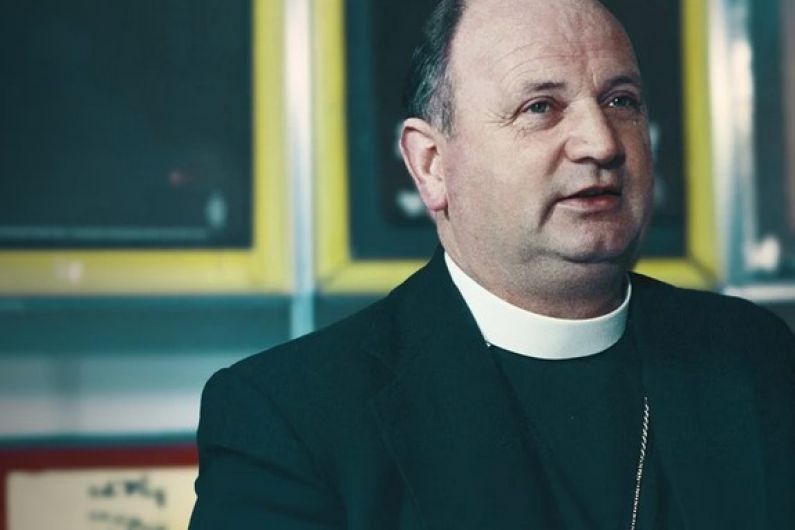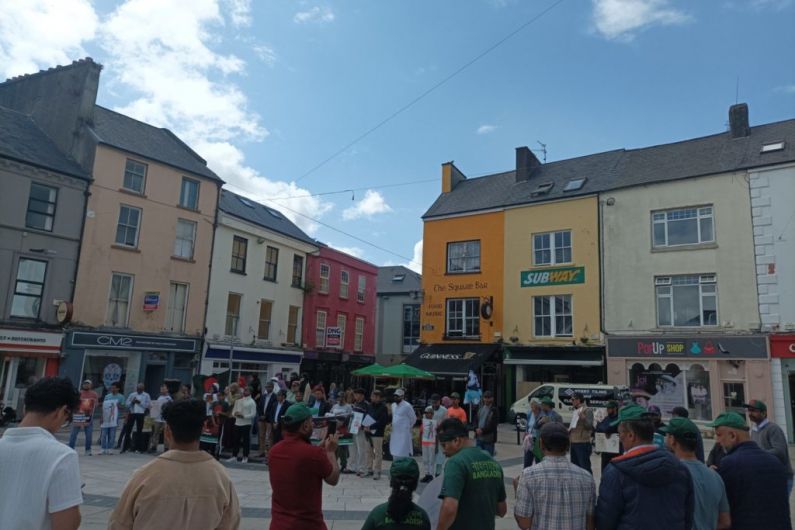Construction on the original Tralee Courthouse began in 1830 and took five years. Designed by William Vitruvius Morrison, it was built using locally quarried limestone from Castle Green. It’s situated on Ashe Street, which was formally Nelson Street.
It was upgraded in 1981. Notes from the architects at the time noted the original was an excellent example of the Greek Revival Architecture. The building had fallen into disrepair as a result of widespread infestation of dry and wet rot in structural timbers. The decay progressed to such an extent that the courts vacated the premise in the early 1960s.
Following the upgrade, the architects said a new layout was followed, so as to provide amenities more in keeping with today’s needs. Those being the needs of 1981 Ireland. The upgrade included gutting most of the building, sterilisation of the walls not taken down, while an enclosed garden and an extended foyer were constructed.
The Greek Revival, an architectural movement of the late 18th and early 19th centuries, didn’t cater for those with who’d accessibility concerns. The 1981 upgrade didn’t either.
A change in the law
16 years ago, the Disability Act 2005 came into force.
Under part 3, Access to Buildings and Services and Sectoral Plans, it reads:
A public body shall ensure that its public buildings are, as far as practicable, accessible to persons with disabilities.
The new law was very accommodating. It allowed businesses and public bodies a period of ten years to ensure their buildings were accessible to people with disabilities.
In 2006, Radio Kerry carried the following story.
The Court Service says it could be another two years before wheelchair users will be able to enter the courthouse in Tralee.
The Chairman of the Kerry Branch of the Irish Wheelchair Association, Cllr Terry O’Brien was unable to give evidence at a recent sitting of Tralee District Court because of the problem.
The building, which is located on Ashe Street in the town, is one of three remaining courthouses that are due to be refurbished, but some cases can be heard at alternative venues upon request.
Terry O’Brien says the provision of wheelchair facilities is long overdue.
The Courts Service had a further nine years to act.
15 years on from that story, I contacted Mayor of Tralee, Labour councillor and wheelchair user Terry O’Brien.
He had to sign up for the 2007 General Election at Tralee Courthouse.
December 31st, 2015 marked the deadline for all public buildings in Ireland to be made fully accessible for those with disabilities.
The courthouse on Ashe Street hasn’t changed, in relation to access.
Legal Obligations
A year later, in 2016, the Courts Service was reminded about its legal obligations in relation to access in Tralee Courthouse.
According to information released through the FOI Act to Radio Kerry, the Courts Service received correspondence from the Disability Federation of Ireland in 2016.
Áine O’Sullivan, Community Development Worker, wrote that she had helped to set up Tralee Access Group, which aims to ensure that Tralee town is accessible for all, including people with a disability, mobility issue or parents with a buggy.
She told the Courts Service that accessibility was an important issue and, as the service knows, it is everyone’s right to access public buildings under the Disability Act 2005.
No record of any reply to Ms O’Sullivan’s concerns were given in the FOI documentation.
Defendants
But, in the day-to-day running of the local courts system, was a lack of access actually affecting anyone?
I spoke to local solicitor Patrick Mann.
Plans for wheelchair access
There are plans for improving wheelchair access to Tralee Courthouse. It turns out the proposals have been on the wall for years.
Here’s Kerry Sinn Féin TD and solicitor Pa Daly.
Get out clauses
However, there are exemptions to the Disability Act 2005, which, if applicable, would mean the Courts Service is not breaking the law in relation to access in Tralee Courthouse.
Here are those exemptions:
A minister of the government may, by order, declare that the requirements under the act shall not apply to a public building specified in the order […] for a number of reasons.
-
- (a) the building is being used temporarily as a public building and will cease to be used as such after 3 years from the date of the making of the order,
- (b) the building will not be used as a public building after 3 years from the date of the making of the order, or
- (c) making the building accessible to persons with disabilities would not be justified, on the grounds of cost, having regard to the use to which the building is put.
In layman’s terms, the minister can exempt Tralee Courthouse from being held to this standard if it’s being used as a temporary building or will not be used after three years. Also, the issue of cost is a common reason for the lack of accessibility on the Ashe Street complex. We’ll address that in a moment.
I asked the Department of Justice if any minister had made such an order about Tralee Courthouse?
The department, despite responding to my query, didn't say if a minister has or hasn’t made such an order.
Could a ramp be constructed?
Is space an issue? Is there room for a ramp or lift to be installed? I measured the exterior of the courthouse in recent days.
The front door of Tralee Courthouse is just over 3m above street level. The width of the courts complex is over 40m, meaning a ramp running from one side to the other would give a gradient of 1m rise for every 13.3m – which is within Irish Building Regulations.
Irish building regulations have the following rules around the gradient of access ramps.
Ramped access routes should be designed to have the shallowest gradient practical. The preferred maximum gradient is 1:20 but where site specific constraints require it, ramps not steeper than 1:12 may be provided if individual flights are not longer than 2000 mm.

But there are some who prefer to keep the front steps unaltered.
On both the northern and southern sides of the courts complex, adjacent to a 5-metre-wide footpath, are two vertical rises of just over 1.5m, ideal for a wheelchair lift.
Cost has been cited as a reason for not installing wheelchair access over the decades.
A wheelchair lift, delivery costs included, from AliExpress.com costs €1,700.
The installation costs would be minimal as this is what’s called a platform lift, meaning it’s simply bolted to a flat surface.
In order to make Tralee Courthouse fully accessible – from Ashe Street at least - two of these outdoor wheelchair lifts would be needed at cost of €3,400. Granted, there are more expensive wheelchair lifts available.
However, cost has been mentioned as a prohibitive factor in recent years.
Punishment
Were someone to be convicted of breaching the Disability Act 2005, what would be the punishment?
The act states that:
55.— (1) A person who is guilty of an offence […] is liable on summary conviction to a fine not exceeding €3,000 or imprisonment for a term not exceeding 12 months or both.
The punishment is cheaper than the cost of remedying the issue.
Complaints
But a lack of accessibility doesn’t just affect defendants. It also affects complainants.
I put a hypothetical scenario to Kerry Sinn Féin TD and solicitor Pa Daly. Consider this: A wheelchair user complains about a building’s lack of access under the Disability Act 2005 and seeks a remedy against the property owner in Tralee court. The complainant, wishing to provide evidence in the case, arrives at the courthouse, yet finds no way to attend the sitting which is investigating someone else’s alleged breach of the Disability Act. What happens?
Judge Brian O'Callaghan
As an addendum to material I requested under the FOI Act, the Courts Service says it surveyed all its buildings as part of customer service action plans and worked hard to improve access for all court users. For example, in the refurbished and newly built courthouses over the past twenty years, all jury boxes and witness boxes are made wheelchair accessible.
The Courts Service adds that all new and refurbished courthouses are universally accessible and are recognised as world leading in this regard. The Criminal Courts of Justice in Dublin has been mentioned in many citations and received praise and attention for the universality of it access.
While that is great to hear, it’s Tralee Courthouse that’s inaccessible.
In recent months, a member of the judiciary raised this very matter with the Courts Service.
In FOI correspondence released to us, Judge Brian O’Callaghan wrote that he sat in Tralee Courthouse during 2020.
I had to transfer once to Killarney and on another occasion to Listowel Courthouse to enable a case involving wheelchair bound parties to have their cases head. The alternative was to have the parties lifted by people from the public street up 20-plus steps to the courthouse in Tralee and also assist in travels within. The indignity alone visited upon this person and family is an embarrassment to us all.
Judge O’Callaghan also highlighted a potential scenario where the Courts Service might itself be taken to court.
The Courts Service (into which these premises are vested) may also find itself as a defendant very soon in proceedings which are bound to be launched by a challenged party or witness to proceedings. For the past ten years or more, any decision on new updated facilities has been tossed between the Courts Service, local politicians, legal practitioners, government departments and others. The classic prevarication – which would make Sir Humphrey proud – has resulted in this appalling situation in which we find ourselves.
In 2006, Radio Kerry carried a story about a Dublin hotel which has been charged for failing to provide a wheelchair-accessible toilet. At the time, Jackie Barrett, a Listowel town councillor at the time, said premises in Kerry which do not provide wheelchair-friendly toilets should be prosecuted.
But, accessibility has improved in many parts of Kerry since the Disability Act 2005 came into force. In 2017, two Kerry beaches were given beach-friendly wheelchairs.
Kerry County Council made the specially adapted chairs, which glide over sand, available at Inch and Ballinskelligs.
Even beaches are more accessible to wheelchair users than the county’s main courthouse.
Jurors
The 1981 upgrade of the circuit court in Tralee shows the expanded courtroom, with an adjoining judge’s quarters and a place for the jury to retire. The latter is a relatively spacious room for the jurors, complete with their own access from the rear of the court and also down into the circuit court.
Down a set of stairs.
You are eligible for jury service if you are:
-
- A citizen whose name is entered on the register of Dáil electors (list of voters) at the address shown on the jury summons, and
- 18 years of age or over, and
- Not entitled to an exemption.
Wheelchair users, rightly, are neither in the exempted or ineligible categories.
Outside of Ireland, the United States Supreme Court ruled in 1880 in Strauder v. West Virginia that laws excluding black people from jury service violated the Equal Protection Clause of the 14th Amendment.
Through a lack of adequate access facilities in 2021, all citizens with additional accessibility needs are effectively are banned from being a defendant, a complainant, a witness, a solicitor, a barrister, a clerk, a journalist, a judge, a caretaker, a garda in Tralee Courthouse.
They not able to comfort a son or a daughter or parent or a friend during a stressful trial in Tralee Court.
All because of a lack of access.
- ENDS -
Report by Eamonn Hickson, with help from Shauna McElligott on research. February 2020






